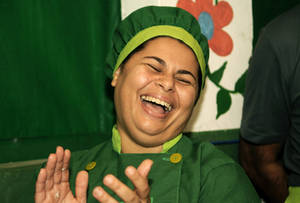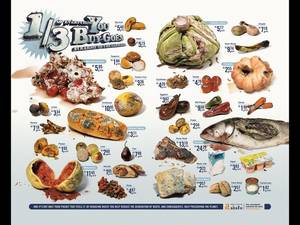Future Now
The IFTF Blog
Brazilian Culinary Eco-patriot Reduces Food Waste
In our recently released 2011 forecast report Food Choices in Flux, we looked at Brazil in 2021 “where parents who once faced the threat of hunger are now watching their children struggle with obesity, but where lack of access to food remains a serious concern for many people.” This led to a forecast about the rise of culinary eco-patriotism – where eating Brazilian foods, particularly from remote areas such as the Amazon, becomes a way for residents to express their national pride while supporting sustainable production. In this future the meanings of sustainability will expand and eating local, Brazilian foods will be connected with status.
We see a new signal of this out of last week’s Slow Food Fair in Turin, which featured Brazilian food waste champion Regina Tchelly. As a culinary eco-patriot herself, Tchelly teaches that even with the lowest budget, one can eat well by utilizing Brazilian foods traditionally considered waste. Her secret recipe? Risotto with watermelon rind (Which she also claims works as a natural Viagra.)

Tchelly grew up poor in the North-East of Brazil and began working as a maid in Rio de Janeiro. She knew how to use every part of a food – down to the pumpkin rinds and banana peels – and was surprised by the amount of waste common in her employer’s kitchens. She knew how to be much more efficient with ingredients. In 2011, with less than US$100, she launched Favela Orgânica so that she could share her love of cooking while improving sustainable food practices and nutrition for favela residents in Rio de Janeiro. Within a year she had won US$5,000, bought a refrigerator and new utensils, and was given access to the kitchen and cafeteria of a local school. She now holds weekly classes, and at the end of this month will quit working as a maid so that she can devote herself to the program.
Tchelly has been called the “ambassador of ‘aproveitamento total’ (‘making the most of everything’)” and she has successfully turned a pragmatic practice (repurposing watermelon rinds) into part of a global food trend (showcasing her risotto recipe in Italy). Frugality becomes a mark of social status when it is aligned with national sustainability goals, so poor and wealthy Brazilians alike can take pride in their thrifty consumption. As we forecasted in our report, consumers from all income levels in Brazil will search for ways to align their personal financial security with national environmental security and wealth.
Newfound affluence will allow Brazilians to be more discerning about their food choices, but an increase in demand for packaged food creates new issues for food waste. A 2009 estimate from the Akatu Institute for Conscious Consumption claimed that, similar to the US and Europe, one third of all food in Brazil goes straight to the trash – that’s 39,000 tons per day. At the same time, millions of Brazilians are food insecure. The Akatu institute ran a series of ads (pictured below) that reminded people “It’s not only your pocket that feels it. By reducing waste you help reduce the generation of waste, and consequently, help preserving the planet.”

A class at Northwestern University’s Kellogg School of Management has paired up with The Global FoodBanking Network to tackle this problem with a social venture idea called “Ligação Fresco.” By connecting food producers with processors, this online platform becomes a virtual marketplace for unsalable produce. According to GFN, “Types of products, culling date, quality, and pricing are listed. Retailers, aggregators, packhouses indicate on an online portal what excess product they have available to purchase by processors who manage the logistics. By Year 5, “Ligação Fresco” is projected to facilitate over 1.6 million transactions annually and generate $2.6 million in revenue, while eliminating 30,000 tons of CO2 emissions.”
Combining large-scale changes in production and distribution with individual commitments to waste less while still eating well, Brazil is witnessing an important shift in its food system. For more forecasts about food futures in Brazil (as well as Europe, China, and North America,) please see our report Food Choices in Flux.



